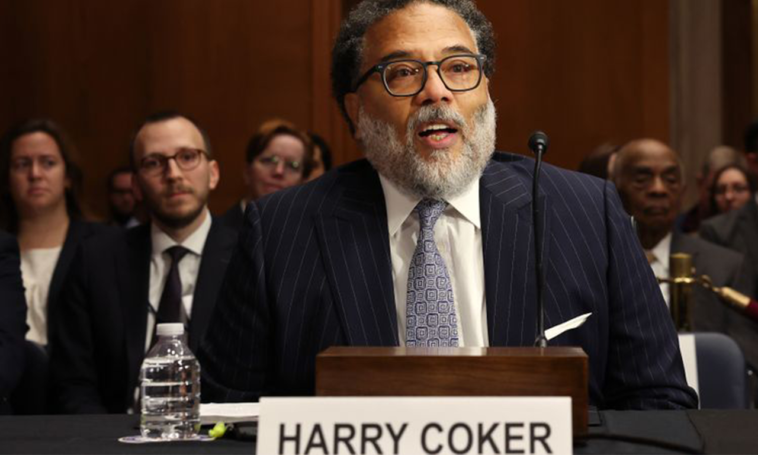Senate confirms Harry Coker Jr. as national cyber director.
A Crucial Leadership Role in Shaping AI and Cybersecurity Policies as Senate votes to appoint Harry Coker Jr as National Cyber Director.
In a significant move, the Senate has confirmed Harry Coker, Jr. as the second-ever national cyber director, filling a vital leadership position that will significantly influence the trajectory of artificial intelligence (AI) and cybersecurity policies across federal agencies.
Senate documents reports say “The 59-40 vote solidifies Coker’s role in heading the Office of the National Cyber Director (ONCD), a position with far-reaching implications for the nation’s digital security landscape.”
Harry Coker, Jr., a distinguished 20-year Navy veteran and former third-in-command at the National Security Agency, brings a wealth of experience to his new role.
His recent tenure as an operating partner at C5 Capital, a London-based firm specializing in funding businesses in the cybersecurity, energy security, and space industries, underscores his expertise in critical sectors.
Additionally, Coker has served as an adviser at Primis Principiis, acted as an outside director at JSI, and holds a senior fellowship at the McCrary Institute for Cyber and Critical Infrastructure Security at Auburn University.
Senator Gary Peters, D-Mich., praised Coker’s qualifications, describing him as an accomplished leader and dedicated public servant well-suited to lead the ONCD.
The confirmation follows a 10-month vacancy that arose when the inaugural national director, Chris Inglis, stepped down in February. While Kemba Walden had temporarily taken over as acting director, she was not nominated for the permanent position, leaving a crucial leadership vacuum at the ONCD.
Coker’s confirmation assumes significant importance in light of the ONCD’s role in overseeing the implementation of the Biden administration’s National Cybersecurity Strategy, unveiled in July.
Coker will play a pivotal role in shaping budget proposals aligned with these strategic initiatives. His position will also grant him a seat on the White House’s AI Council, emphasizing the interconnected nature of cybersecurity and artificial intelligence policies.
During his nomination hearings this fall, Coker underscored the importance of collaboration with the private sector to counter increasingly complex cyber threats.
He not only emphasized the need for external partnerships but also highlighted the importance of introspection within the government. Coker stressed the necessity of recruiting the next generation of IT talent to lead and sustain efforts in the evolving cybersecurity landscape.
A notable concern raised by Coker is the age distribution within the federal workforce, with just 7% of permanent full-time federal employees being under the age of 30.
To address this, Coker recommended an expansion of recruiting efforts beyond traditional four-year colleges and urban areas. Diversifying the pool of candidates is crucial for enhancing the effectiveness and adaptability of the government’s cybersecurity initiatives.
The ONCD’s role extends beyond its immediate responsibilities, as it joins several federal bodies with influence over the government’s IT and cybersecurity posture.
The evolving landscape underscores the imperative for every agency, whether tech-oriented or not, to modernize its digital defenses. Congress and the White House have made it clear that cybersecurity is a shared responsibility, and policies have been introduced to set deadlines and expectations for progress in these critical areas.
Coker’s confirmation comes at a time when the federal government is increasingly recognizing the importance of integrating advanced technologies, such as AI, into its operations.
The ONCD, under Coker’s leadership, is expected to navigate these challenges and contribute to the ongoing efforts to strengthen the nation’s digital resilience.
The Biden administration’s focus on advancing AI and cybersecurity is evident in the strategic initiatives laid out in the National Cybersecurity Strategy. Coker’s role will be instrumental in overseeing the progress of these initiatives and aligning budget proposals accordingly.
As the government grapples with the evolving threat landscape, the leadership at the ONCD assumes a central position in steering the nation toward a more secure and technologically resilient future.
Harry Coker, Jr.’s confirmation as the national cyber director marks a crucial milestone in the ongoing efforts to enhance the nation’s cybersecurity and AI capabilities. His wealth of experience, coupled with a focus on collaboration and talent diversification, positions him to play a pivotal role in shaping policies that will have a lasting impact on the nation’s digital security landscape.
The interconnected nature of AI and cybersecurity further underscores the significance of Coker’s role in navigating the complex and rapidly evolving challenges ahead.




Join the Community and Be a Part of the Conversation
You must be logged in or registered to post a comment.